Blog del sito
EH4F Showcases Future-Ready Training at HELIX 2025
Barcelona, 15 May 2025
Eurecat presented the results of the European project e-Hospital4Future (EH4F) at the HELIX 2025 Summit—an initiative aimed at delivering innovative training modules for healthcare professionals by combining soft skills, technical expertise, and digital innovation. This comprehensive approach responds to the emerging needs of the healthcare sector, promoting a flexible and modular learning model adapted to the challenges of a rapidly evolving environment.
Continuing education in healthcare
Both EH4F and the HELIX Summit 2025 are aligned with the most critical and transformative priorities in contemporary healthcare education. From the integration of digital innovation and immersive learning environments to the development of essential soft skills and strategic decision-making capabilities, both initiatives reflect a shared commitment to preparing healthcare professionals for a future that is not only technologically sophisticated but also deeply human-centered.
At HELIX 2025, the EH4F project presented its innovative approach to training healthcare professionals for the demands of a rapidly evolving sector. EH4F responds to the urgent need for transformation in healthcare education by combining soft skills, technical expertise, and digital innovation into a comprehensive and flexible learning model.
(Article continues after the photos)
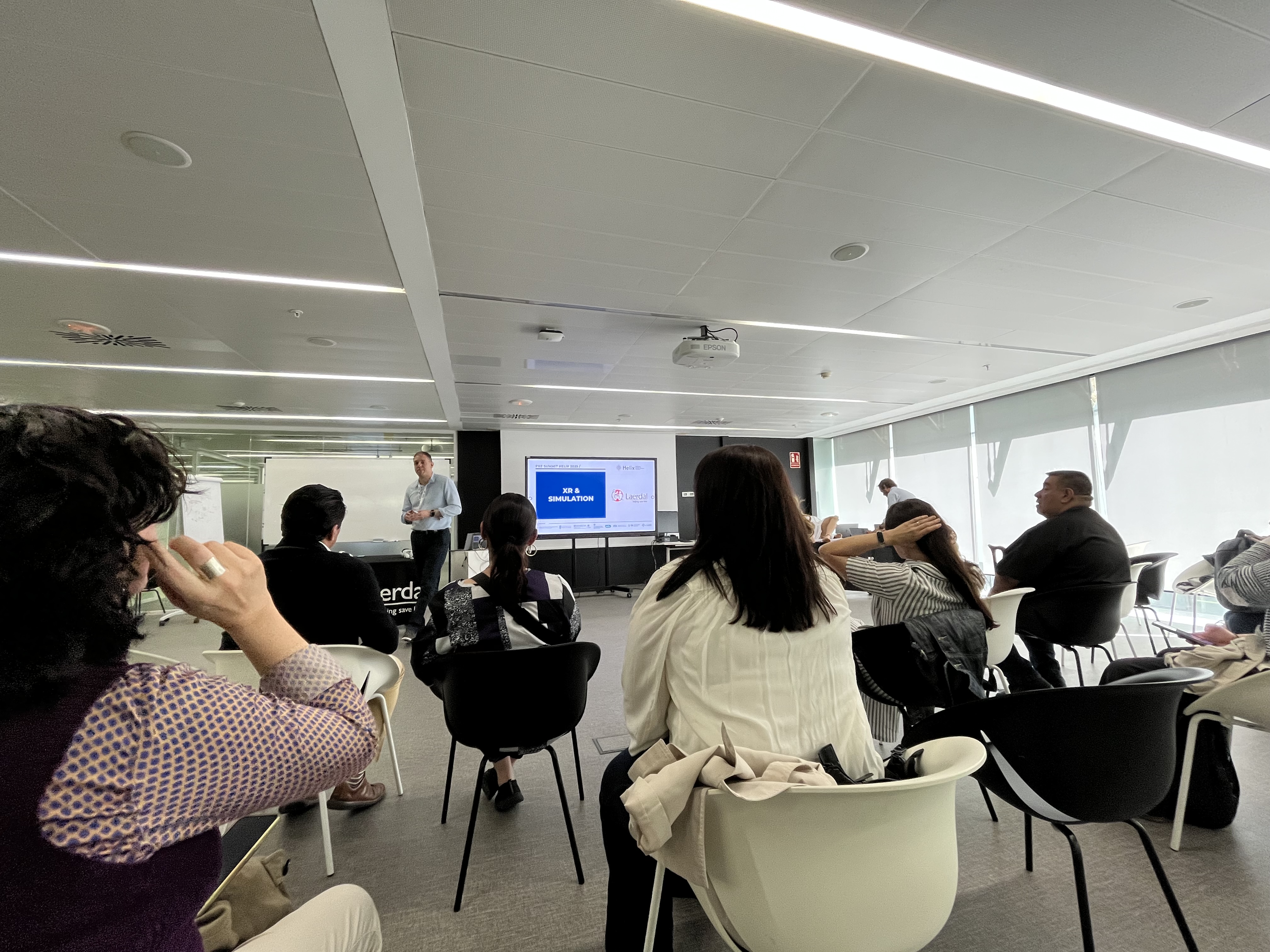
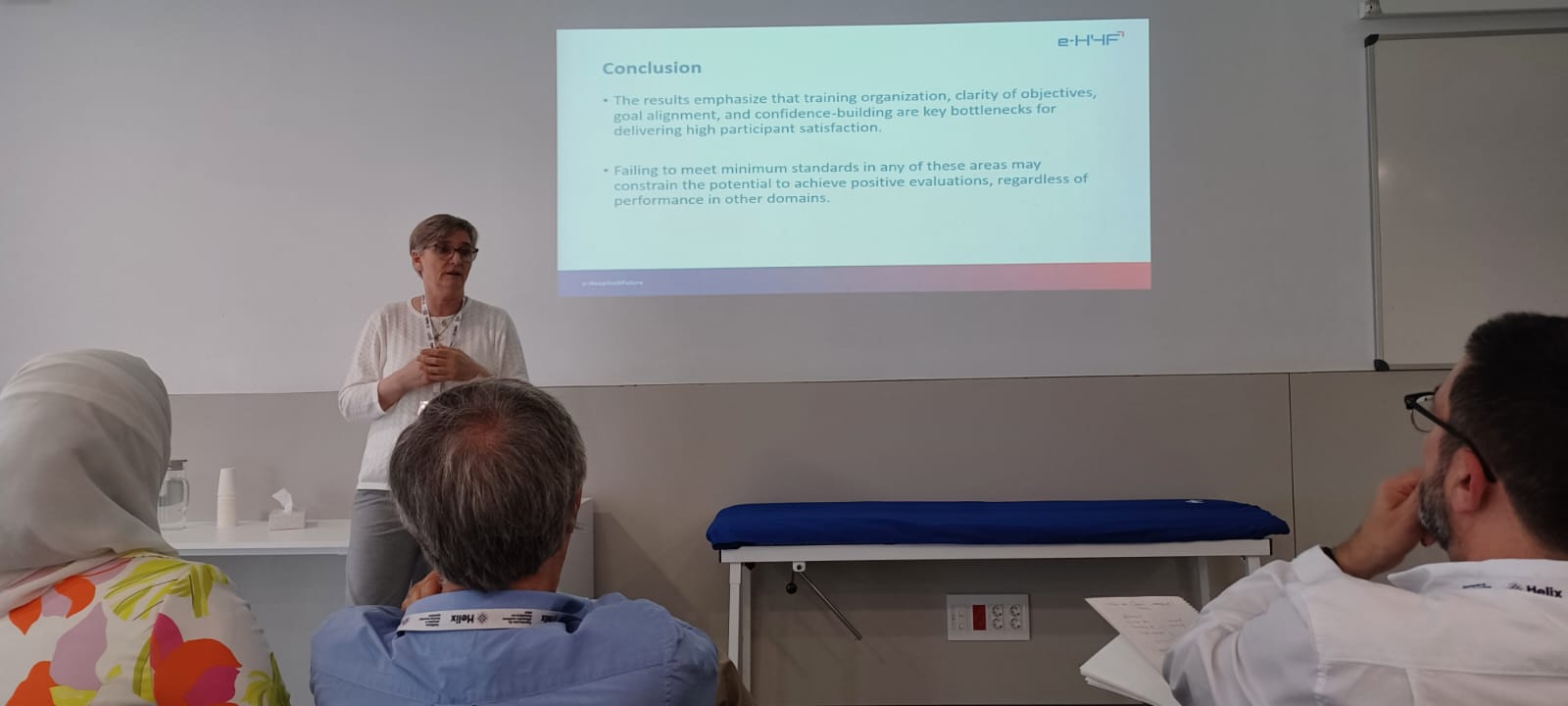
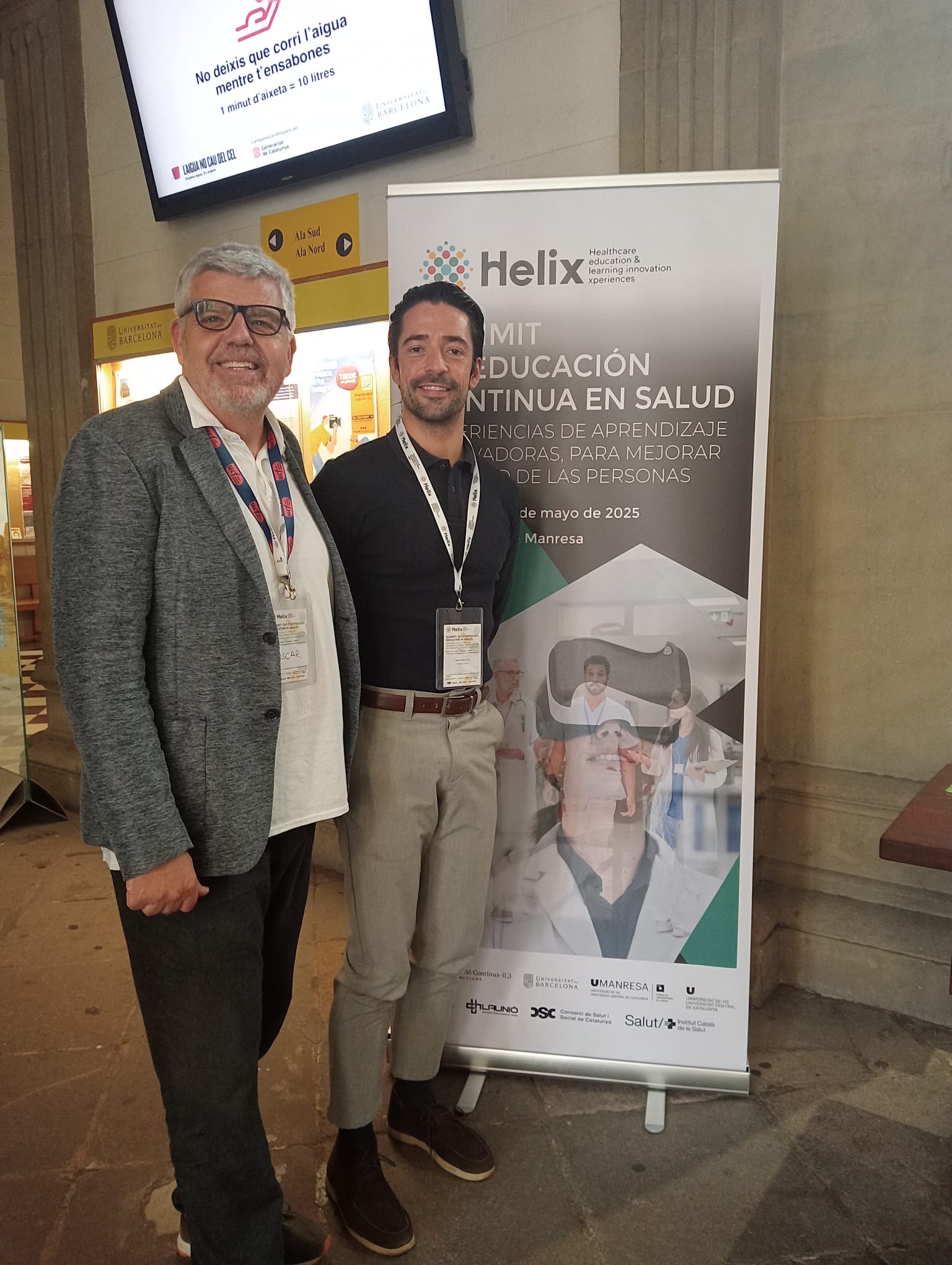
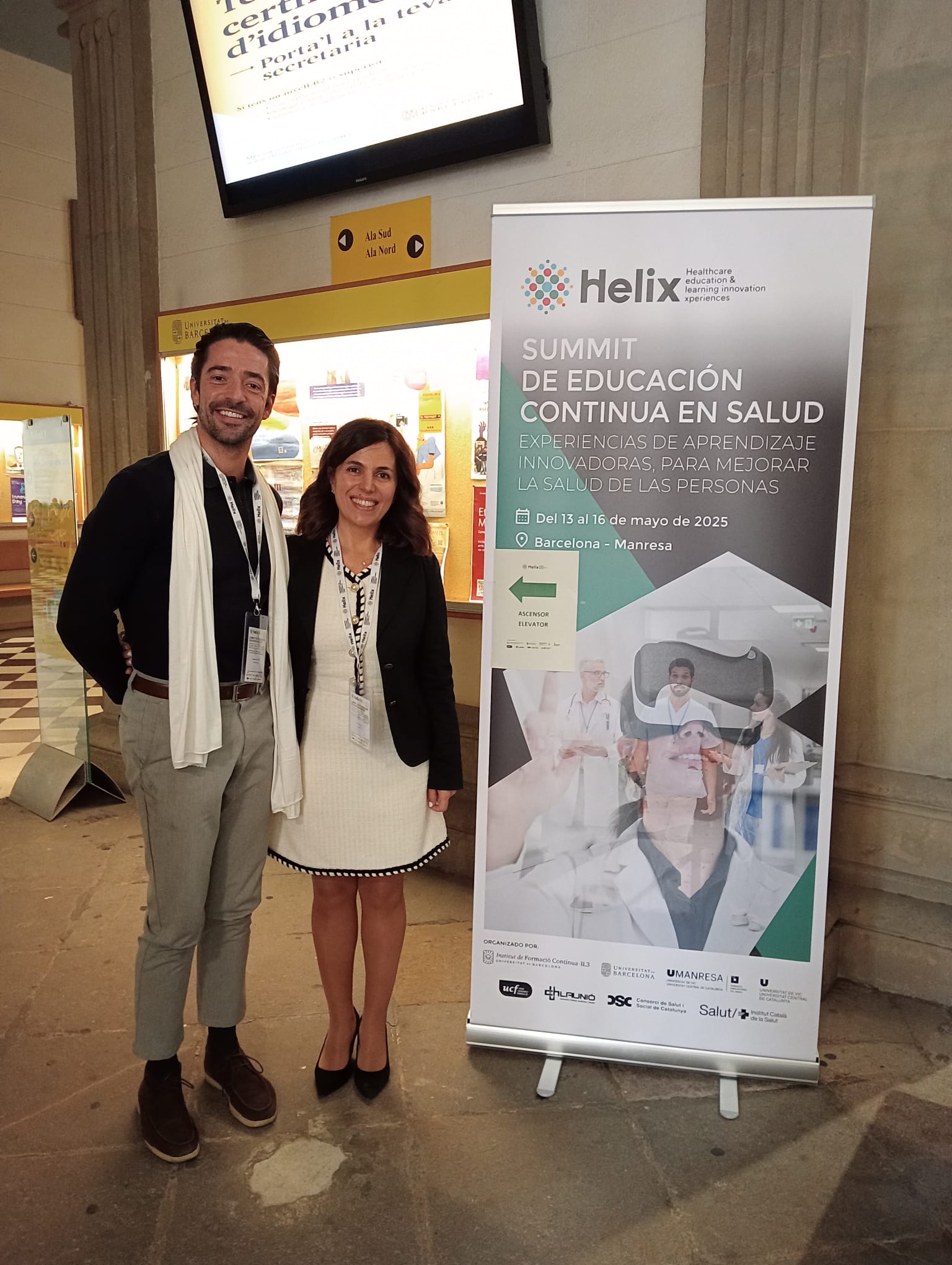
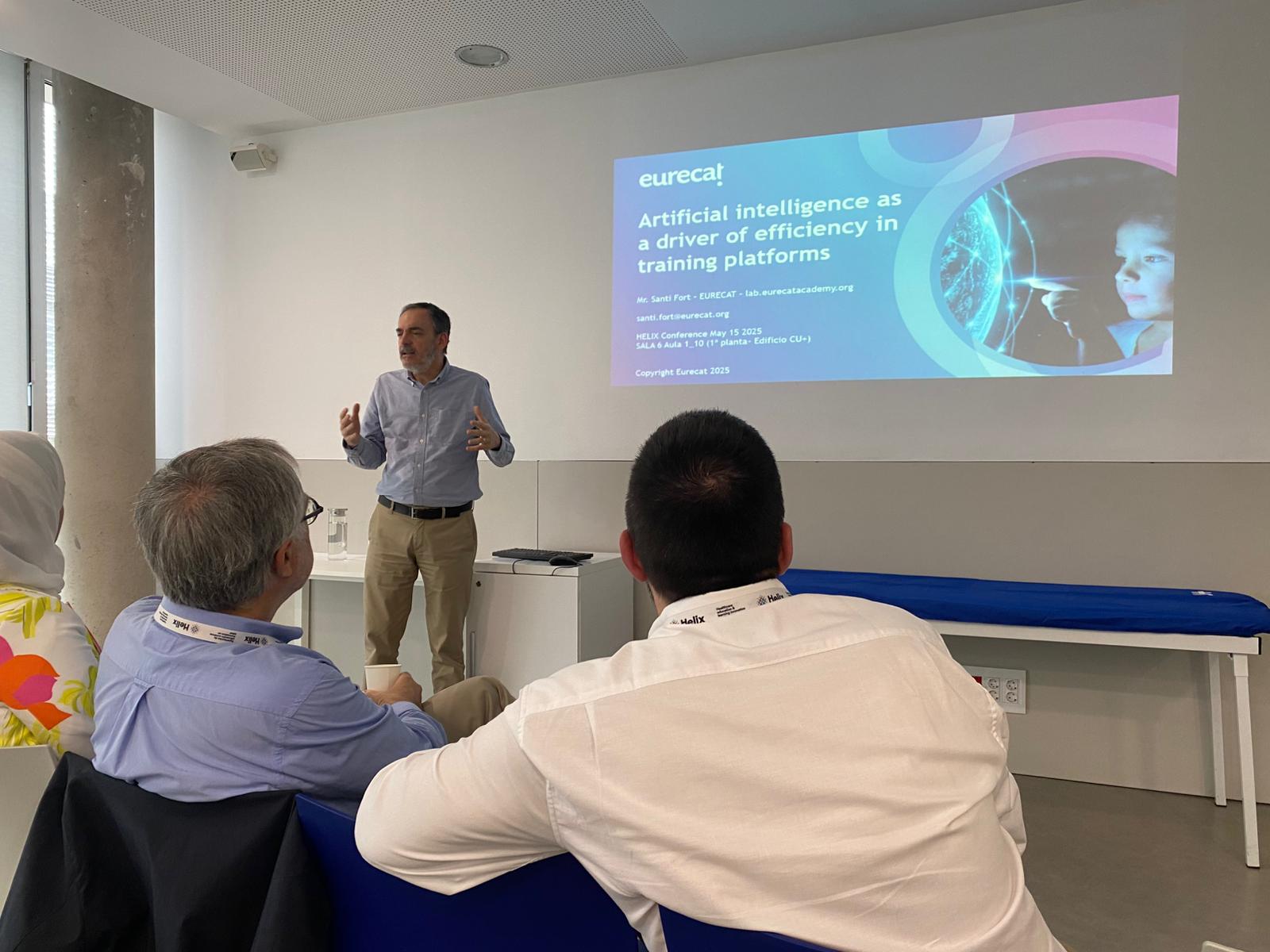
The project was represented by a strong delegation from Eurecat, including David Marí and Luis Marte as Digital Health experts, Santi Fort as leader of the innovation in training line, and José A. Gago, expert in innovation processes. They were joined by international partners from the EH4F consortium: Berit Helgheim from Molde University College (Norway) and Susana Nicola from ISEP (Portugal). The participation was fostered by Francesc Teixidó, Eurecat’s Head of Training Business and Innovation, and coordinated by Almudena Abengozar, project manager in training innovation.
Connecting systems
Their presence at HELIX 2025 was part of a broader effort to connect university-level continuing education with the learning ecosystems of healthcare organizations. The summit, led by Óscar Dalmau, Director of Innovation and Development at UCF, brought together professionals, educators, and institutions to explore new methodologies and scale collaborative projects across Europe and beyond.
Held from May 14 to 16 across key venues in Manresa and Barcelona—including the University of Vic, the University of Barcelona, and Hospital Clínic—the HELIX Summit provided a dynamic platform for dialogue, co-creation, and digital experimentation. EH4F’s contribution was particularly aligned with the summit’s focus on methodological innovation and digital transformation in health education.
Both HELIX 2025 and EH4F demonstrate how the convergence of innovation, collaboration, and education is reflected in the inclusion of key themes such as Artificial Intelligence and Machine Learning, soft skills development, and decision-making in healthcare. These areas are not only timely but essential for shaping the future of health education and practice.
EH4F has developed three learning pathways that strongly resonate with the themes explored at HELIX:
Essential Soft Skills in Healthcare: Focused on the human side of care, this pathway emphasizes communication, empathy, teamwork, and leadership—skills increasingly recognized as critical to patient outcomes and team performance.
Decision Making in Healthcare: This pathway equips professionals with tools to make informed, ethical, and timely decisions in complex clinical and organizational contexts, fostering critical thinking and systems awareness.
Artificial Intelligence and Machine Learning in Healthcare: A forward-looking pathway that introduces participants to the technologies reshaping diagnostics, treatment planning, and healthcare management, bridging the gap between innovation and practice.
These themes were not only present in EH4F’s sessions but also echoed throughout the HELIX program—particularly in the digital experience circuits and co-creation workshops—highlighting a shared vision: preparing healthcare professionals for a future that is both technologically advanced and deeply human-centered.
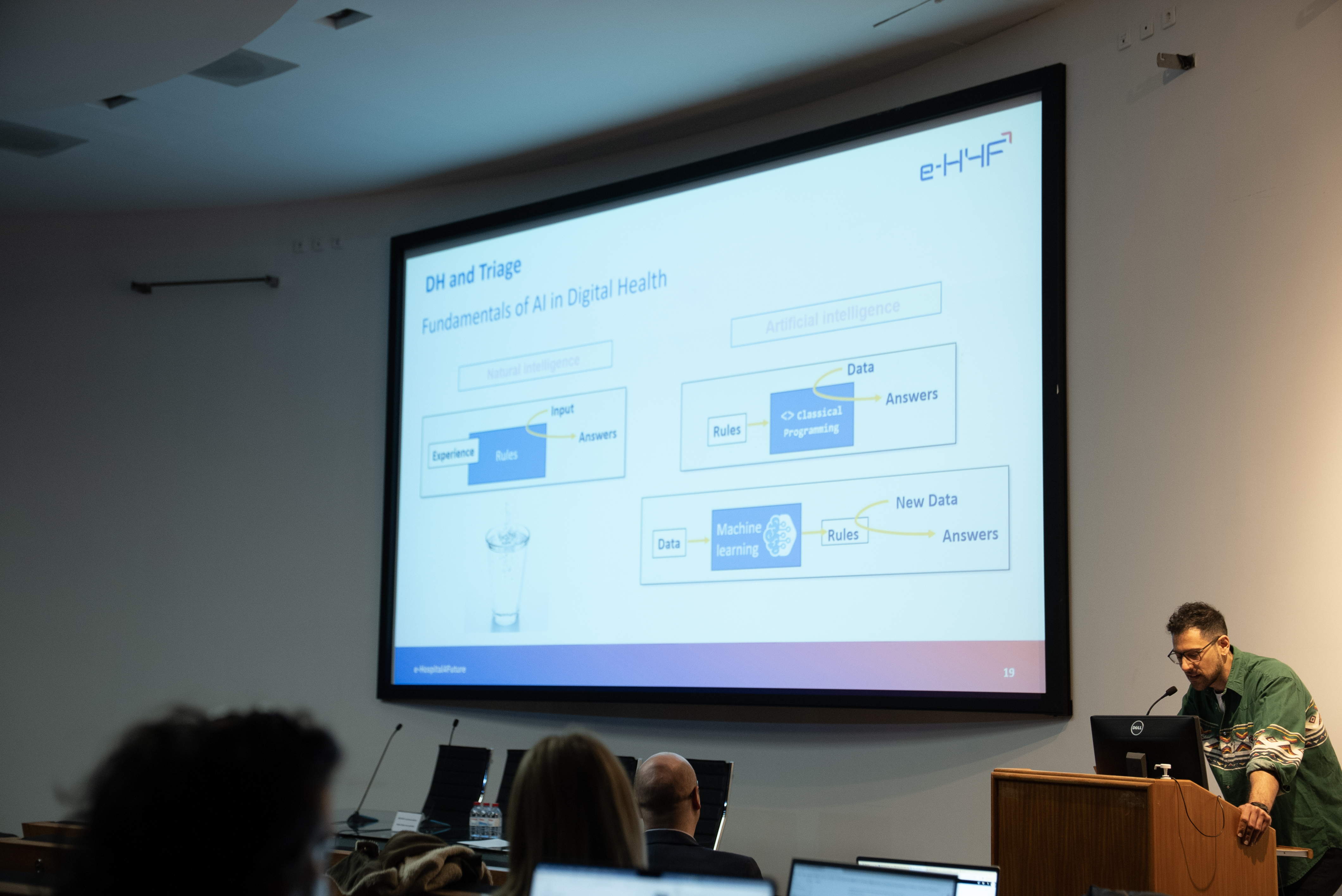
Porto, Portugal, March 25 - 26, 2025
On March 25–26, 2025, the international conference “Healthcare in the Digital Age: Skills, Leadership and Technology" was held at Centro Hospitalar Universitário de Santo António in Porto, Portugal. The event was organized as part of the eHospital4Future project.
The two-day event gathered healthcare professionals from across Portugal – including doctors, nurses, clinical and non-clinical staff – to exchange knowledge and experiences on developing digital skills, leadership in healthcare teams, and the latest technologies improving care delivery.
Conference Programme Highlights
Digital skills in everyday in-patient care
Hanne Westhovens | Hogeschool PXL
Leadership and teamwork in nursing
Isabel Kortleven | Hogeschool PXL
Evidence-based nursing by using AI
João Carlos Ferreira | Hogskolen I Molde
Optimizing digital acceptance in resistant healthcare professionals
Hanne Westhovens | Hogeschool PXL
Patient triage based on digital tools
Silvia Orte and Luis Jose Martíe Fernandez | Eurecat
Data-driven healthcare
Ana Madureira | Instituto de Engenharia do Porto
Testing and programming pacemakers and heart stimulators: cardiac pacemakers
Georgijs Nesterovičs | Pauls Stradiņš Clinical University Hospital
The conference provided a platform for discussions on the future of digital healthcare, bringing together a diverse group of professionals dedicated to advancing healthcare through technology.
Topics and speakers
- "Patient Safety" Berit Irene Helgheim, Molde University College (Norway)
- "Data-driven Healthcare" Ivo Pereira, Instituto Superior de Engenharia do Porto (Portugal)
- "Practical Workshop on Emerging AI, Mixed Reality and the Use of Simulation in Healthcare", Joachim Gregoor, Hogeslschool PXL (Belgium)
- "Evidence-based nursing by using AI" João Carlos Ferreira, Molde University College (Norway)
- "Emotional Intelligence and Stress Handeling" Janita Veinberga, Paula Stadina Kliniska Universitates slimnica (Latvia)
- "Comprehensive Patients' Health Management" Matilede Santos and Margarida Parrado, Universidade Nova de Lisboa (Portugal)
Experts and students come together
The talks and presentations were aimed at students and experienced healthcare workers, delivered and developed by various professionals.

Students getting hands on experience with Emerging AI, Mixed Reality and the Use of Simulation in Healthcare, supervised by Joachim Gregoor (in hoodie).

Berit Irene Helgheim presenting the Patient Safety learning module.
Among the presentations was “Comprehensive Patients' Health Management,” delivered by Biomedical Engineering Students Margarida Parrado and Matilde Santos.

From left: Margarida Parrado and Matilde Santos, Biomedical Engineering Students.
This presentation explored how digital tools can improve patient care and streamline collaboration between clinical and non-clinical teams.
Santos says, "This event marked a significant milestone in our work, which focuses on developing training modules for healthcare professionals, integrating soft skills, hard skills, and digital competencies."
"- This conference was an incredible opportunity to exchange knowledge, explore technological innovations, and drive the transformation of digital healthcare! I am grateful to all participants and colleagues for fostering such an inspiring environment" she continues.
Learn more
See all training modules - available for freeExploring Virtual Reality Tools in Healthcare Education: Practical Seminar Held in Porto
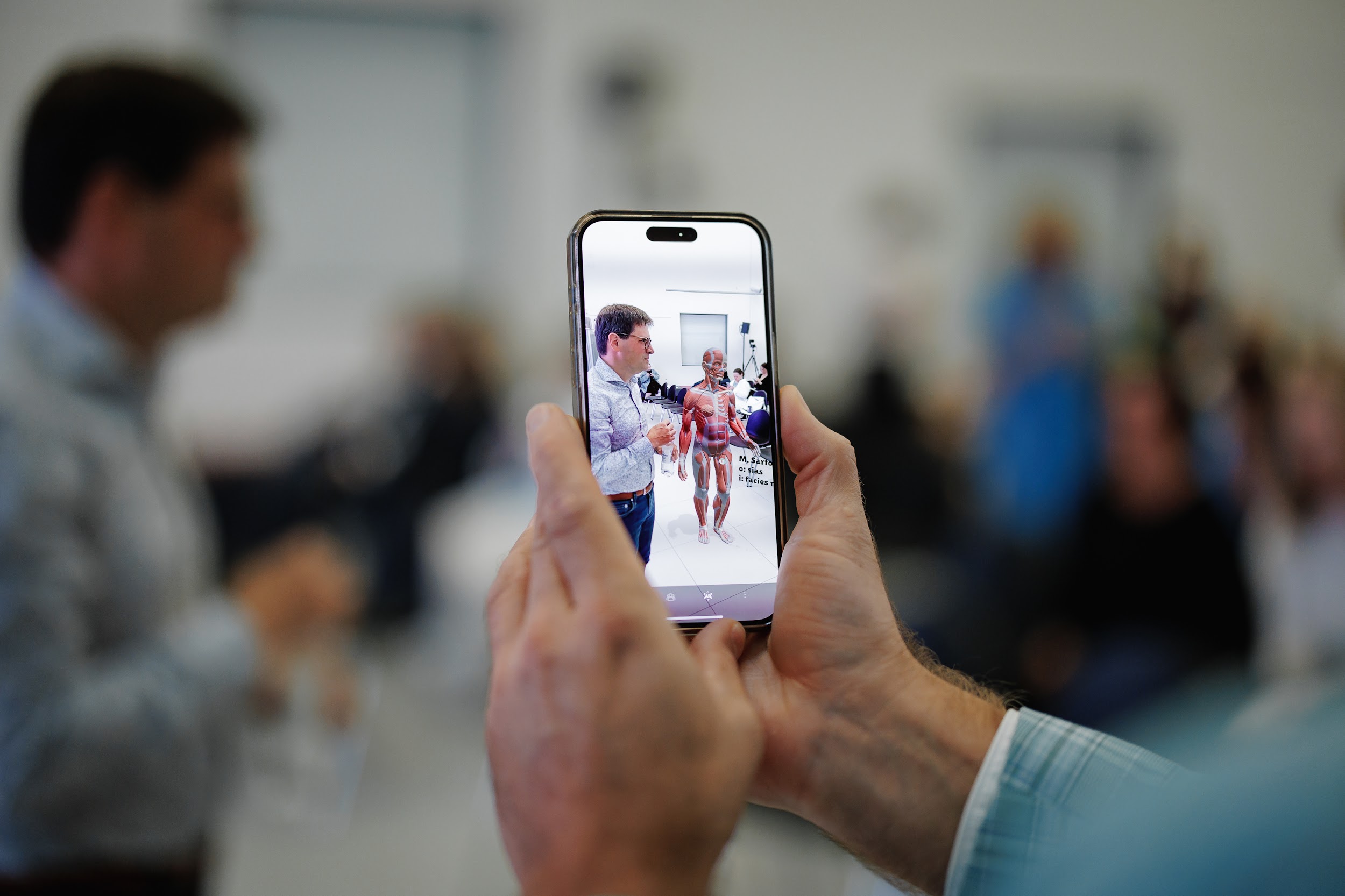
Mixed reality opens up new possibilities for healthcare professionals on the go. Lecturer Joachim Gregoor (on-screen) provides a demonstration of ways to use it in medical settings.
On January 13 and 14, a practical seminar titled "AI Workshop: Augmented Reality and Virtual Reality" took place at Centro Hospitalar Universitário de Santo António in Porto.
The seminar featured presentations by
- Ivone Silva from Centro Hospitalar Universitário de Santo António
- Joachim Gregoor from Hogeschool PXL
- Pedro Rocha from Local Health Unit of Santo António
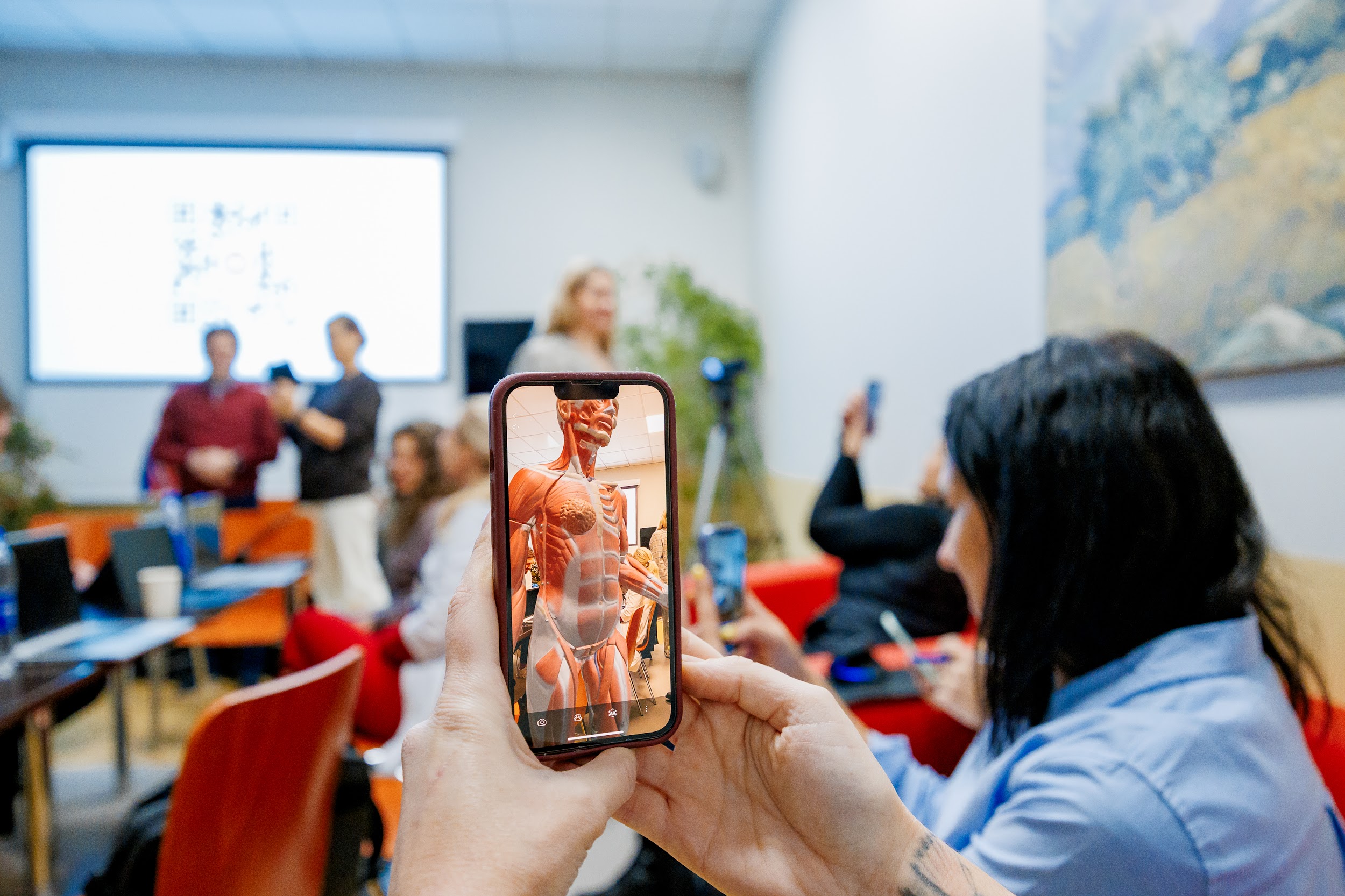
Participants from several sectors in Porto
Around 60 participants attended the practical workshop, ranging from training coordinators of Porto hospitals, lecturers in continuing education of medical staff, technology experts and IT specialists, and doctors and nurses with an interest in ICT (Information and Communication Technology).
Participants explored how these technologies can simplify the daily responsibilities of medical staff, such as delivering digital work instructions directly at the workplace.Ongoing development
The e-Hospital4Future project aims to make continuing education for healthcare workers easily accessible. We are developing 19 new learning modules tailored for medical professionals. These resources will be accessible on this website as training modules to provide widespread adoption in daily practice for European healthcare professionals.
Dates: December 3rd and 4th at 10:00 AM
Location: Paula Stradiņš Clinical University’s Scientific Institute (1st floor), Riga, Latvia
Global theme: Introduction to Virtual Reality, Augmented Reality, and Mixed Reality as tools to support healthcare workers in lifelong learning.
Lecturer Joachim Gregoor Hogeschool PXL is a Belgium University of Applied Sciences and arts. PXL excels at developing courses related with digital skills, healthcare and nursing, being an active member of several ongoing projects.
03.12.2024 at 10:00 am (3,5 hours)
Theme: 360° Video is a simple way to capture reality and use it as a starting point for developing your own virtual reality application.
04.12.2024 at 10:00 am (3,5 hours)
Theme: With the combination of 3D Models and Fectar.com, you can build your own augmented reality application to support the learning process of healthcare workers.
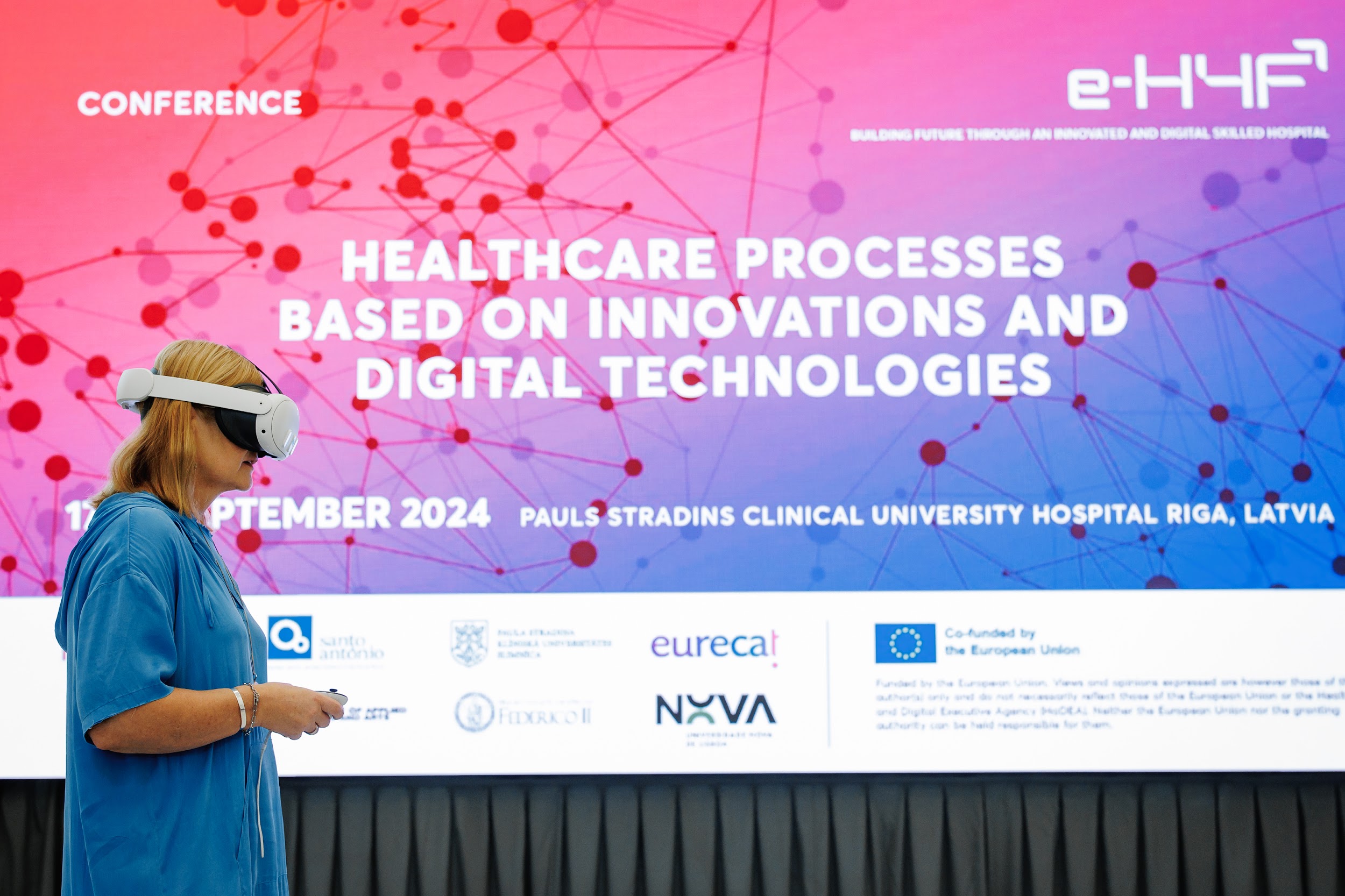
International conference at Paula Stradiņš Clinical University Hospital Showcases Future of Digital Healthcare
Riga, Latvia, September 27-18 2024
[Photos by Kaspars Teilans]
On September 17 and 18, 2024, the Paula Stradiņš Clinical University Hospital hosted the international conference “Innovations and Digital Technologies in Healthcare.” This event was part of the European Union Health Program project e-Hospital4Future.Leading European specialists in digital health and Latvian experts presented training programs on digital healthcare solutions and innovative treatments.
Showcasing training modules
As part of the e-Hospital4Future project, 19 training modules have been developed for online and face-to-face training for medical professionals. These modules were created through the collaboration of European universities, technology centres, and hospitals from eight countries.
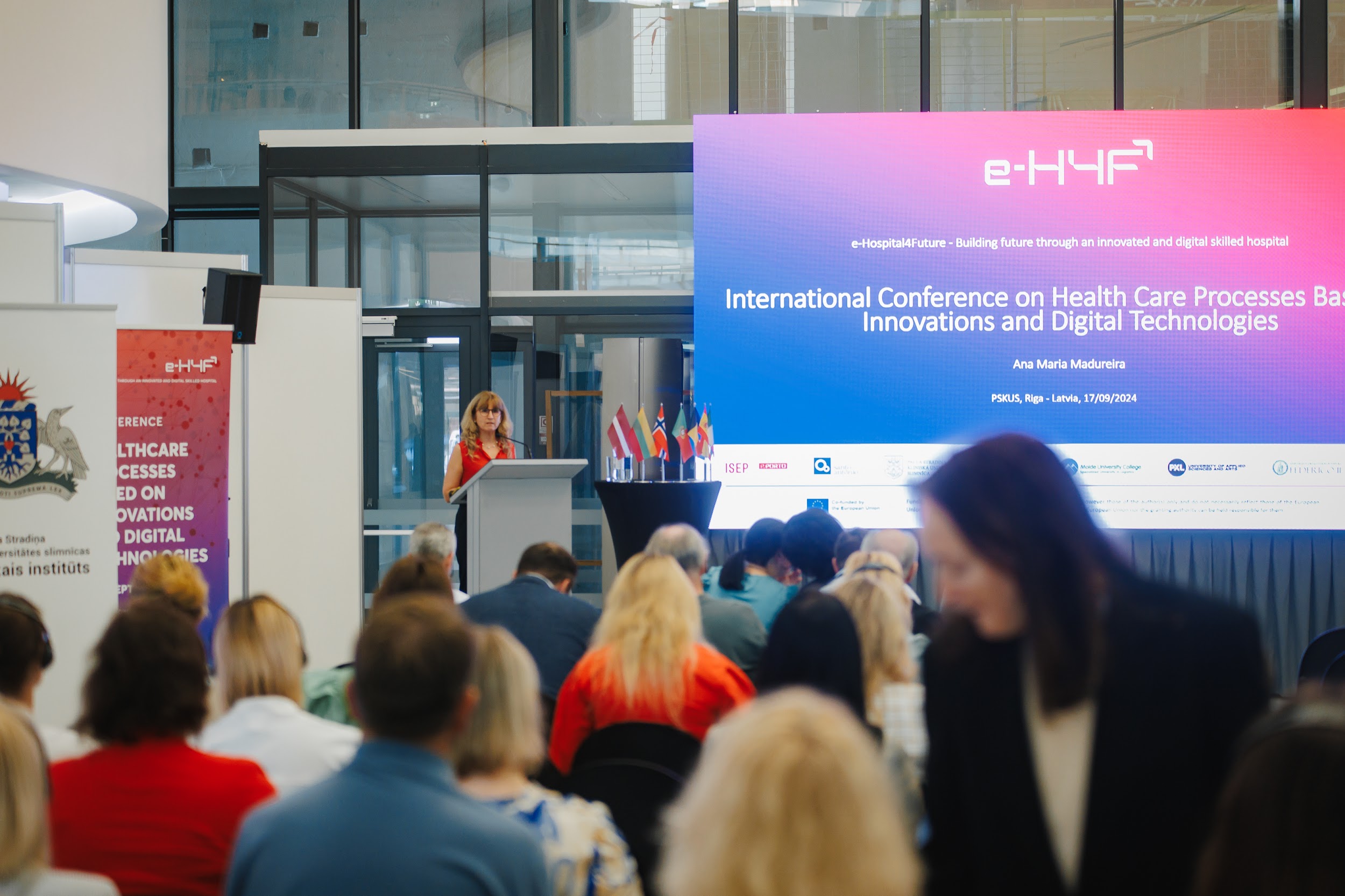
Data-Driven Healthcare was the focus of the opening presentation, given by Project coordinator Ana Maria Madureira, Instituto Superior de Engenharia do Porto (Portugal)
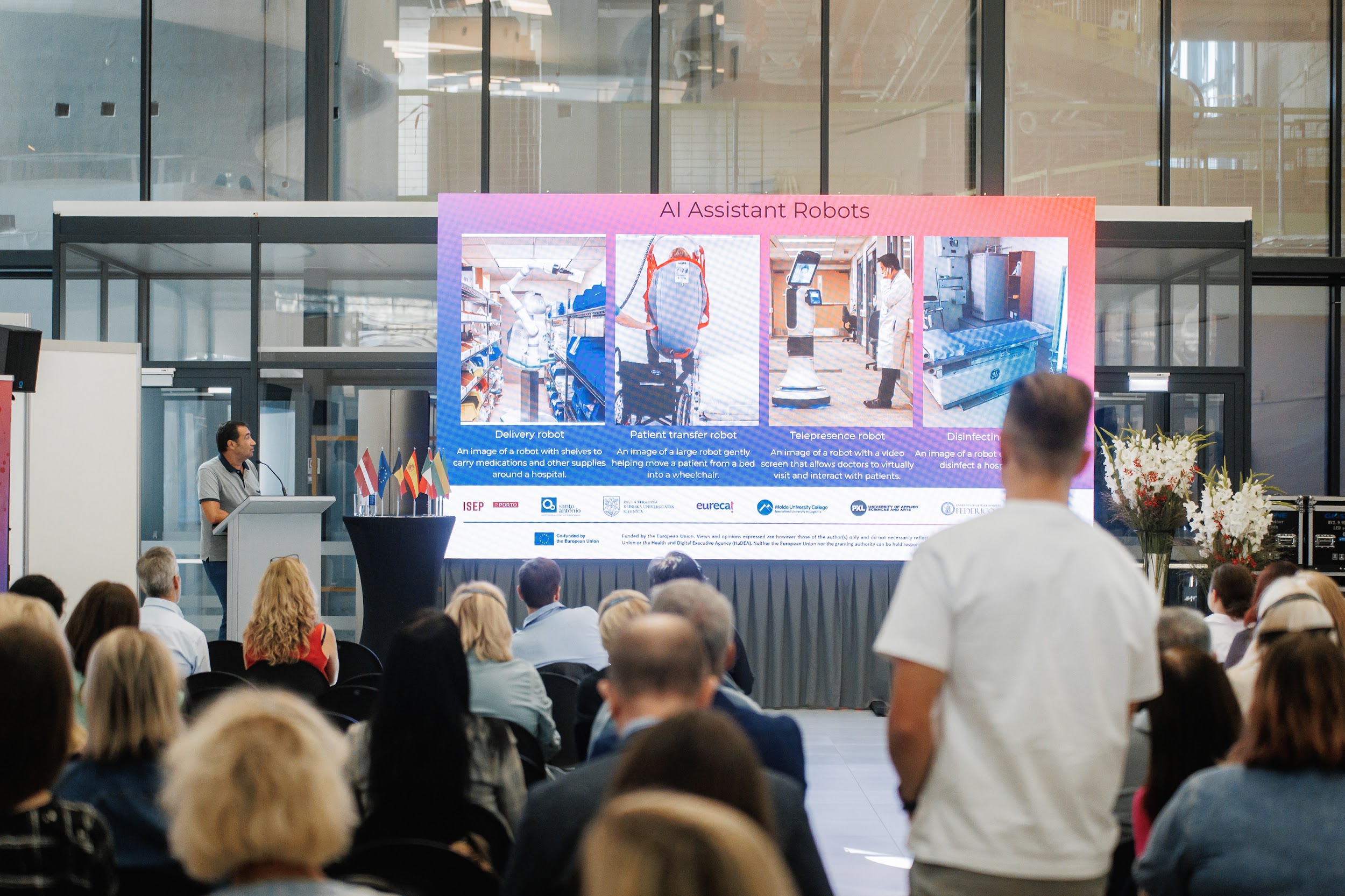
Evidence Based Nursing By Using AI was one of the topics. Here presented by João Carlos Ferreira, Høgskolen I Molde (Norway).
Experts from Belgium, Norway, Portugal, and Latvia provided insights into the curriculum, covering a wide range of topics such as how to better deal with stress and digital change, AI in nursing, Virtual Reality, and hands-on procedures of Extracorporeal Membrane Oxygenation.
10 talks in 2 days
The conference featured
- 7 presentations on digital solutions in healthcare.
- 3 presentations on innovative treatment methods and personal skills for healthcare personnel.
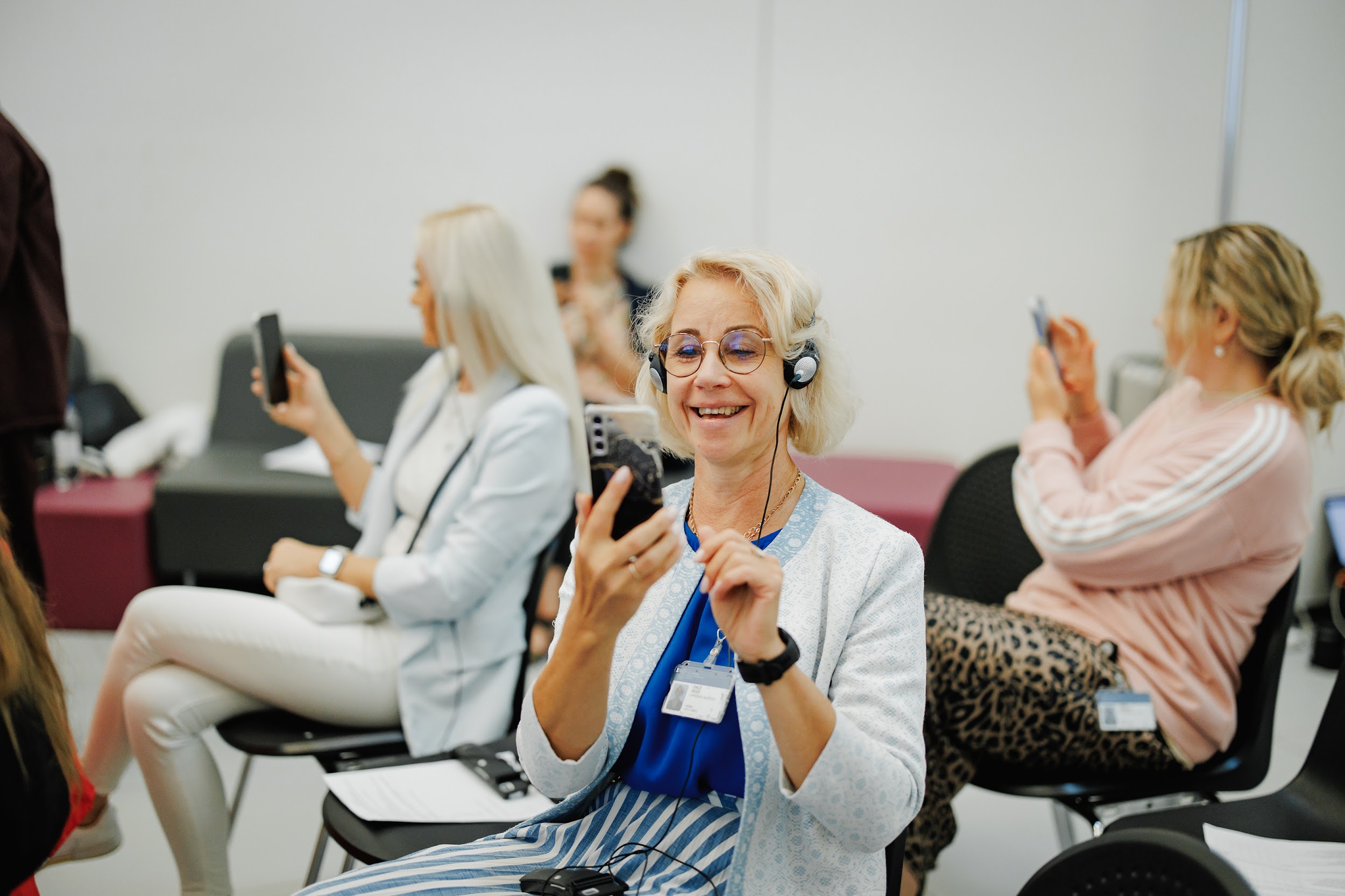
Participants
- Representatives from state health institutions (Ministry of Health and other state health bodies).
- Specialists from hospitals and outpatient facilities, administrative representatives, and association members.
- Medical staff, residents, nurses, medical students, and other interested parties.
Key statements
“I am honoured to present the training programs developed within the project to Latvian healthcare specialists, technology experts, and other interested parties. The conference provided an opportunity to showcase our work and establish promising potential partnerships in Latvia for future projects,” said Ana Maria Madureira, Project Manager for the e-Hospital4Future project.
Ilze Āboliņa, Head of the Education Department at the Scientific Institute of Paula Stradiņš Clinical University Hospital, added:
“This is a great opportunity for Latvia and Stradiņš Hospital to contribute to a large-scale European project aimed at creating continuing education programs for healthcare workers, with a focus on digital tools and the targeted use of artificial intelligence.”
Full Conference Programme
Healthcare Processes Based on Innovations and Digital Technologies, e-Hospital4Future
17 September, 2024
09:00 Data-Driven Healthcare
Ana Maria Madureira, Instituto Superior de Engenharia do Porto (Portugal)
10:30 Emotional Intelligence And Stress Management
Janita Veinberga, Paula Stradiņa klīniskā universitātes slimnīca (Latvia)
11:30 Patient Triage Based On The Support Of Digital Tools
Luis Jose Marte Fernandez, Eurecat (Spain)
14:00 Evidence-Based Nursing By Using AI
João Carlos Ferreira, Høgskolen i Molde (Norway)
15:30 Patient Safety
Berit Helgheim, Høgskolen I Molde (Norway)
18 September, 2024
09:00 Optimizing Digital Acceptance In Resistant Healthcare Professionals
Hanne Westhovens Hogeschool PXL (Belgium)
11:00 Short Introduction Emerging AI/Mixed Reality/Simulation Use In Health Care In Specialized Medicine
Joachim Gregoor, Hogeschool PXL (Belgium)
13:00 Extracorporeal Membrane Oxygenation: Evolution, Teamwork, And Methodology
Edgars Prozorovskis, Katrīna Rutka, Paula Stradiņa klīniskā universitātes slimnīca (Latvia)
14:30 Digital Governance
Luis Lapao, Universidade Nova de Lisboa (Portugal)
16:00 Digitization Of Management Processes And Innovations In Daily Processes
Justs Dimants, Paula Stradiņa klīniskā universitātes slimnīca (Latvia)
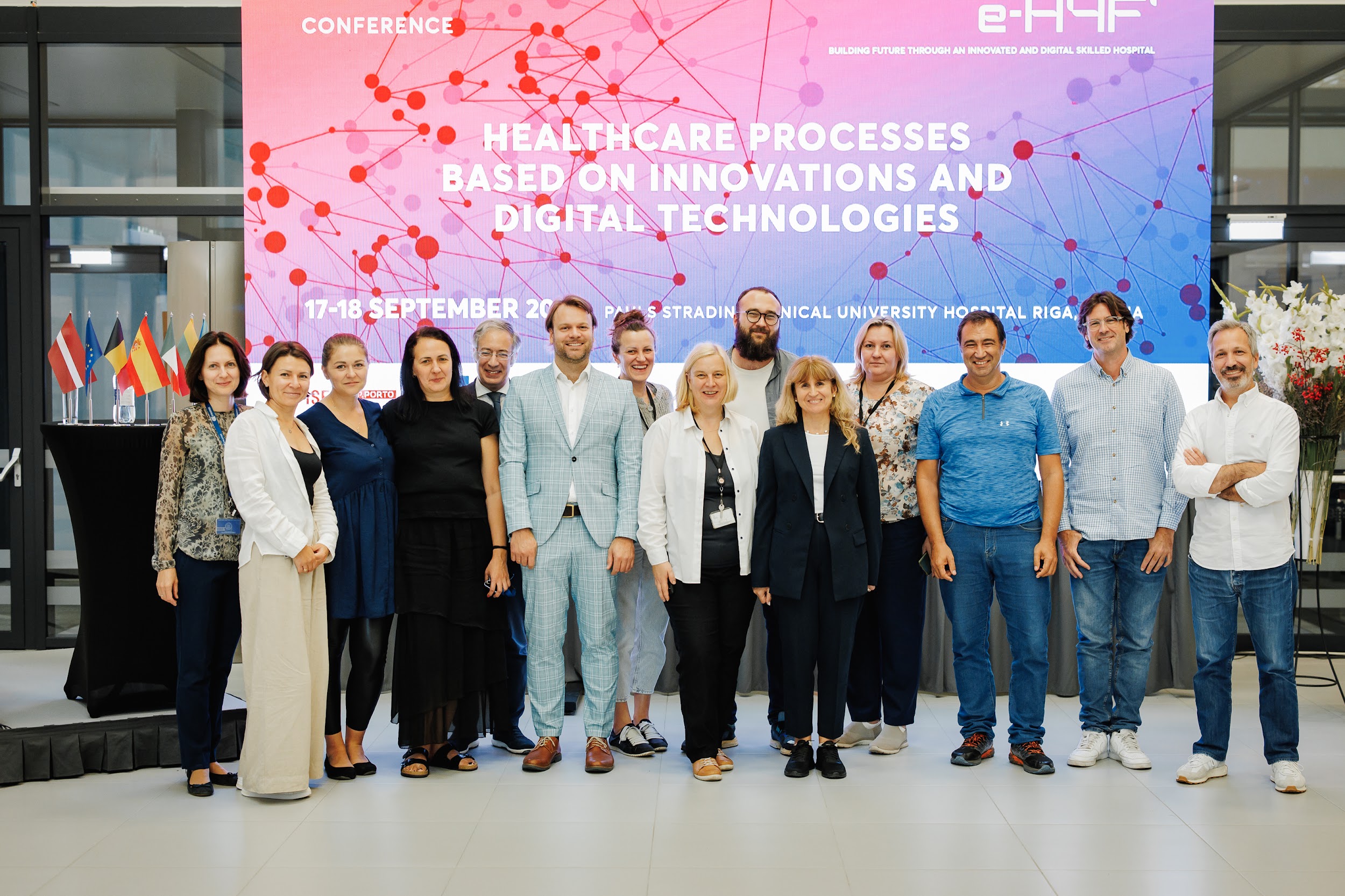
A big thank you to everyone who made this conference possible from the project team!
Project Funding
The European Union’s Health Program (2021 – 2027) finances the project. Project “Building Future Through an Innovative and Digitally Skilled Hospital,” No. 101101190.
Workshop at IEEE Melecon 2024 conference in Portugal
IEEE MELECON 2024 was a hub of innovation and collaboration, and we're very happy to be invited to present and gather insight. IEEE Melecon is a major international forum presenting design methodologies, techniques, and experimental results in emerging electro-technologies. It is one of the flagship conferences of the IEEE Region 8 - the largest region of IEEE including Europe, Africa, and Middle East.
Lively discussions
Our workshop titled "e-Hospital4Future - Building the Future through an Innovative and Digitally Skilled Hospital", led by Susana Nicola, Alexandre Gouveia, Ana Madureira, and Nuno Bettencourt, sparked lively discussions and productive group work.Joachim Gregoor from Hogeschool PXL also contributed significantly by sharing his experiences teaching Emerging AI, Mixed Reality, and Simulation Use in Health Care at Centro Hospitalar Universitário de Santo António.
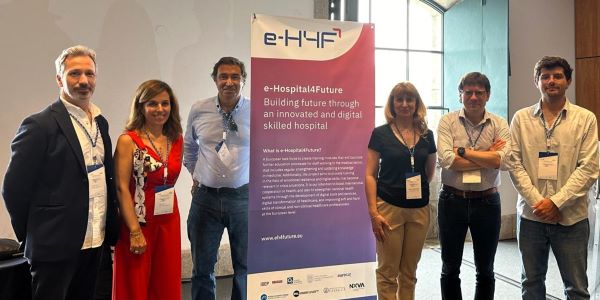
From left to right: Alexandre Gouveia (ISEP), Susana Nicola (ISEP), João Ferreira (HiMolde), Ana Madureira (ISEP), Joachim Gregoor (PXL) and Luís Elvas (HiMolde).
Collaborative methodology
The success of the workshop was largely due to the interactive group work. Using an adapted "Think, Pair, Share" method, participants were able to engage deeply with the project's activities, leading to a flow of suggestions, questions, and future ideas. The workshop concluded with a fun and engaging Kahoot! quiz, testing participants' knowledge of the project and its modules.The event was a resounding success, thanks to the enthusiastic participation and the insightful contributions from all attendees.
Thank you to IEEE for hosting us, and to everyone who joined the workshop!
Feedback is in - Norwegian Nurses overwhelmingly positive to the module “AI4Nurses”
Feedback from both clinical and non-clinical staff about the workshops and training sessions conducted in Latvia, Portugal, and Norway has been collected.
In the "AI4Nurses" workshop held in Norway, 41 dedicated nurses participated and their feedback was overwhelmingly positive.The nurses expressed a need for more practical training and less emphasis on the technical aspects of digital technologies.
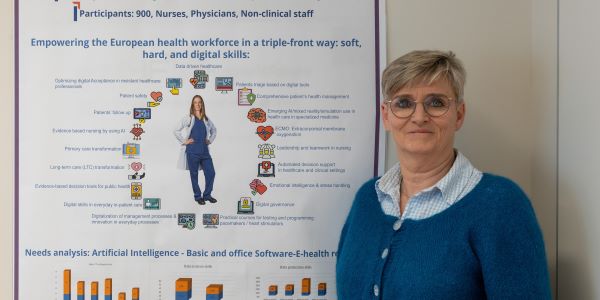
"- Nurses have clearly expressed a desire for more practical training and less focus on technical aspects of digital technologies. We take this feedback seriously and will integrate it into all training modules. The goal of the pilot studies is to acquire knowledge and make necessary adjustments based on participant feedback. This is important to tailor the courses as effectively as possible to the target audience," says Berit Irene Helgheim, Associate Professor of Logistics at Molde University College.
Thank you to everyone who shared their feedback.
International Research Day at Hogeschool PXL, Belgium
Hasselt, Belgium, May 28, 2024
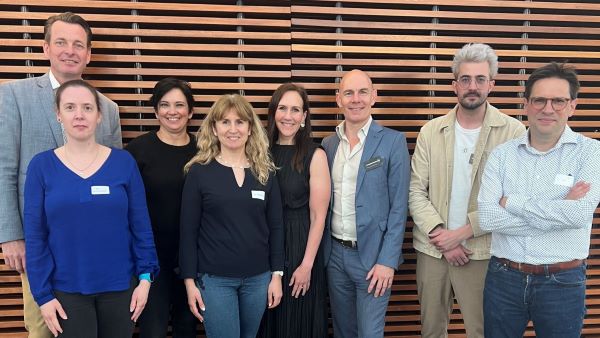
From left to right: Roald Nelissen (head of department PXL Healthcare), Els Knippenberg (researcher care innovation), Isabel Kortleven (researcher care innovation), Ana Madureira (project leader), Kim Daniels (head of Care Innovation), Bruno Van Koeckhoven (EU Research Affairs Manager), Jan Dello (researcher Centre Digital Learning) and Joachim Gregoor (researcher care innovation)
The Health Innovation Festival at Hogeschool PXL aimed to introduce research to educators and professionals in the field. The International Research Day was a great place to share and learn from each other during the festival.
Project leader Ana Madureira delivered an outstanding session on the e-Hospital4Future project, providing insights on how to start and lead such a significant European initiative. Various groups engaged interactively throughout the afternoon to learn more about the project and its potential benefits.
Thank you to everyone who attended and made the International Research Day and the Health Innovation Festival a success!
Empowering Healthcare Professionals: The e-Hospital4Future Project
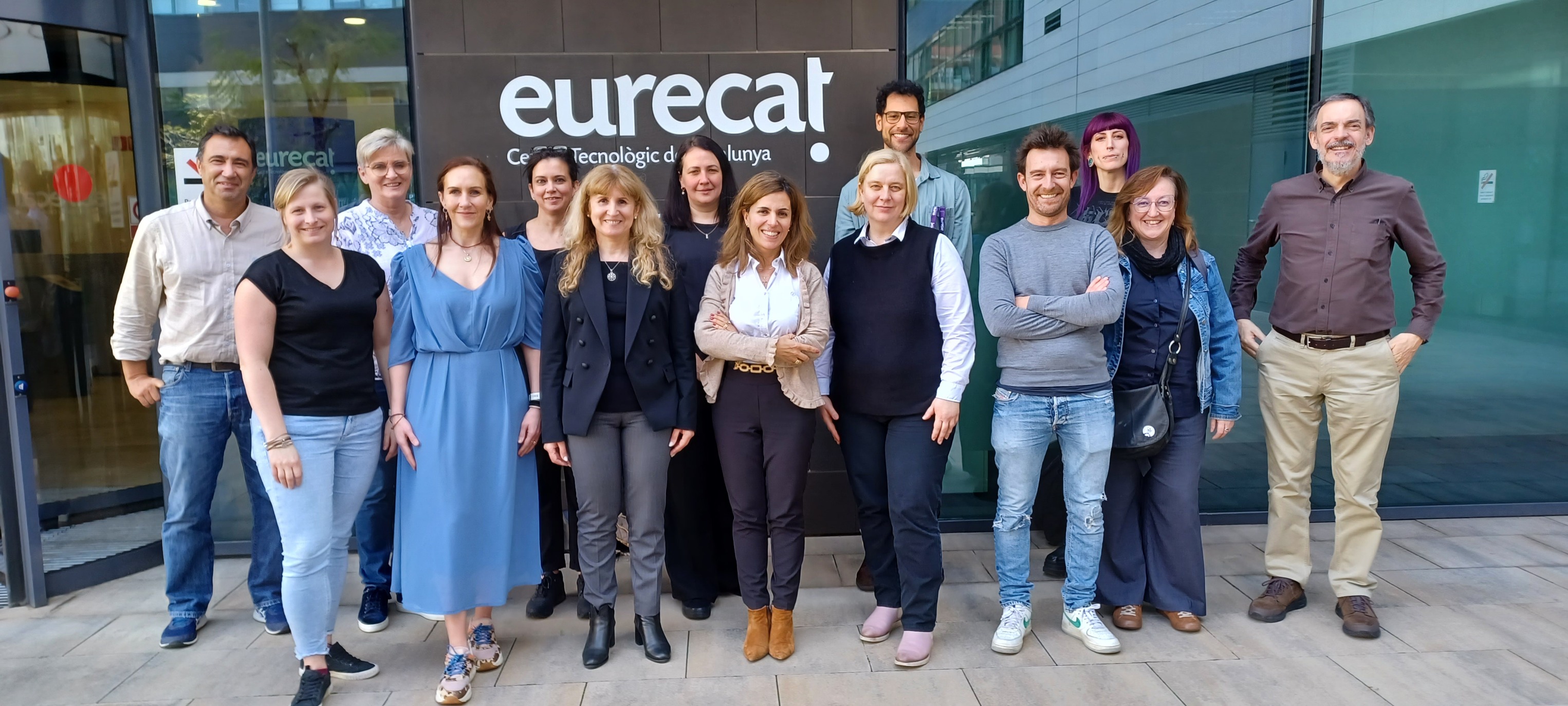
The e-Hospital4Future project aims to create innovative training modules for healthcare professionals in hospital settings.
The focus of e-Hospital4Future is to enhance the education process of health professionals by integrating social skills, technical skills, and digital skills modules.
We're delighted to announce that the eHealth4Future EU co-funded project has reached its one-year milestone with a successful second in-person transnational meeting held in Barcelona.
During this meeting, we engaged in fruitful discussions regarding the future of our project and had the opportunity to showcase the progress we have made thus far.
Our team has been diligently working on developing pilot programs, and we're thrilled to share that more than 70 dedicated healthcare professionals have actively participated and provided invaluable feedback.
Their input has played a significant role in shaping our project's trajectory.
Currently, we are in the process of finalizing 19 courses. These courses aim to assist healthcare professionals in embracing digital solutions to enhance patient outcomes.
We are all excited about the potential impact this project can have in transforming the field of health.
If you are interested in learning more about our project or wish to get involved, please do not hesitate to reach out and connect.
---
#HealthUnion #EU4Health
The consortium consists of
ISEP - Instituto Superior de Engenharia do Porto
@Università degli Studi di Napoli Federico II
Paula Stradiņa Klīniskā universitātes slimnīca
Vilniaus universitetas / Vilnius University Santaros Klinikos